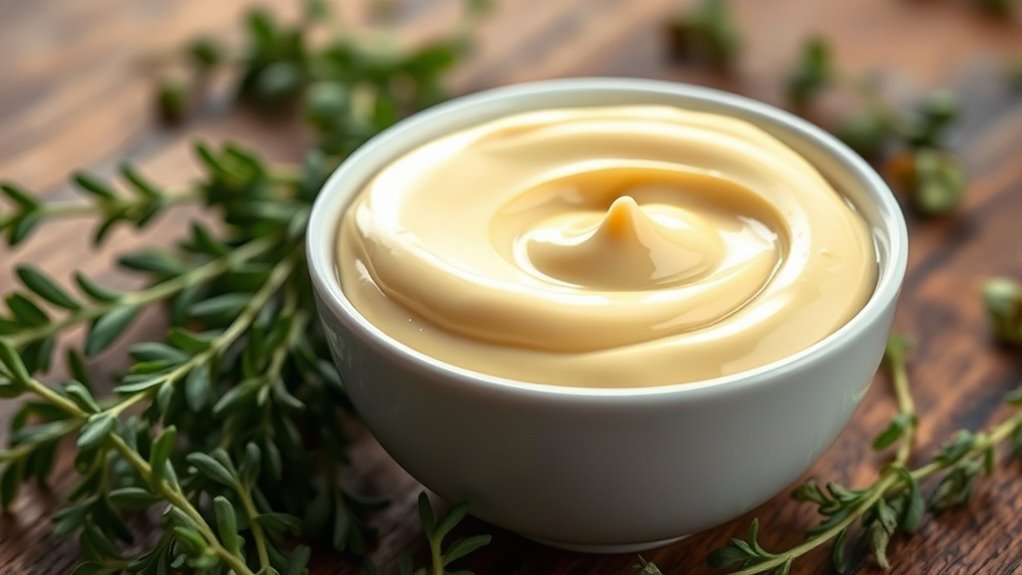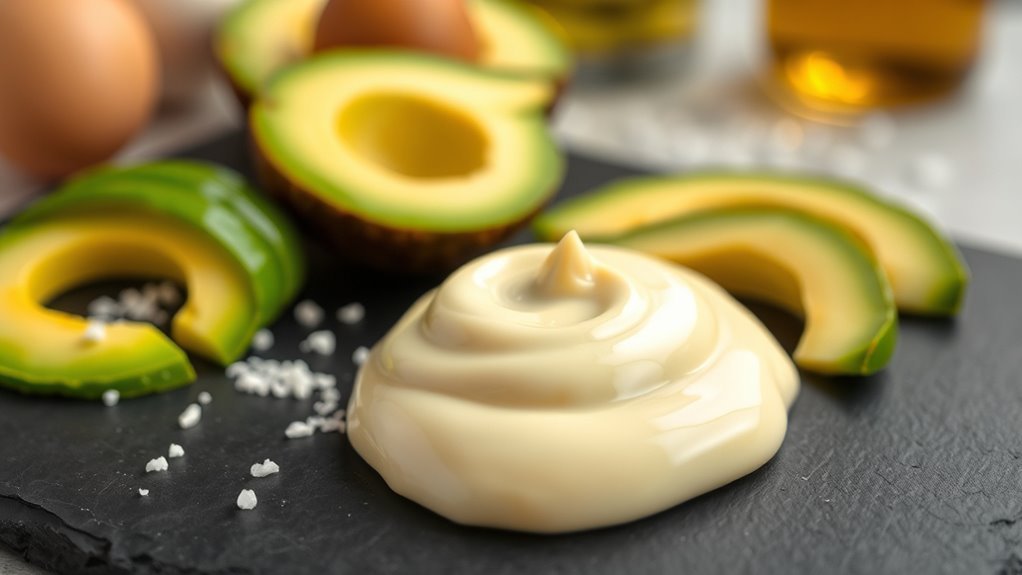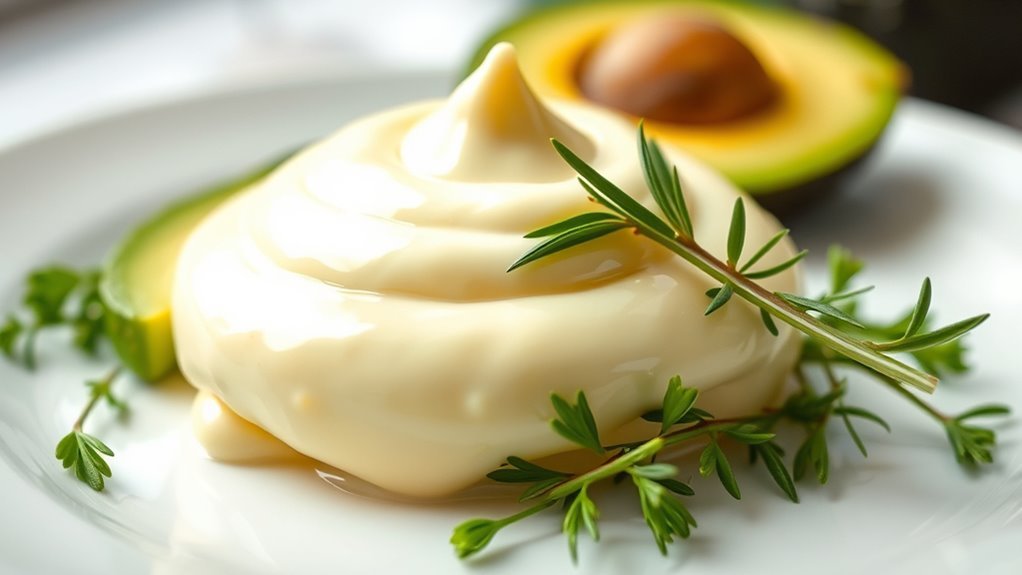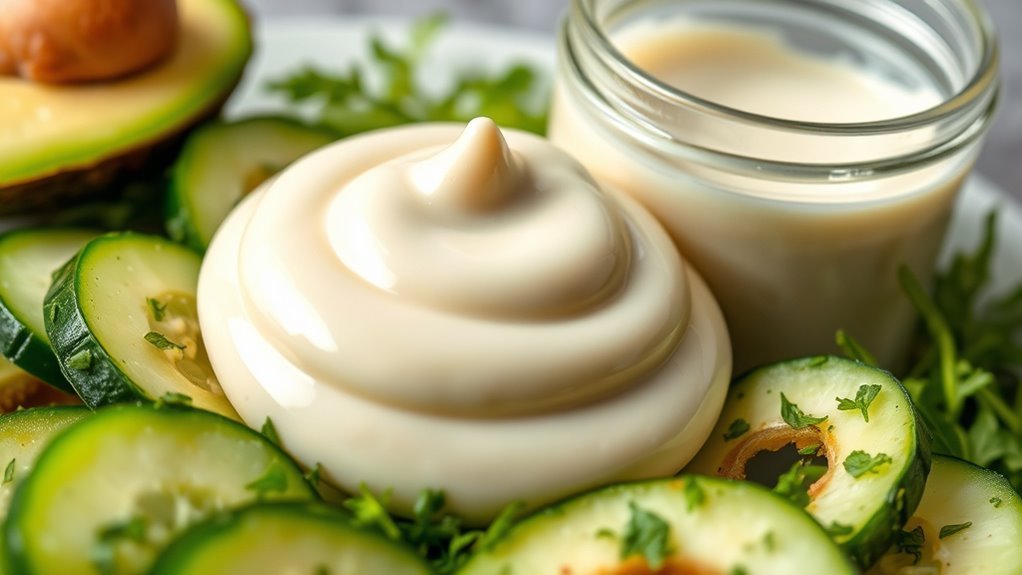Yes, mayonnaise is keto-friendly due to its low carbohydrate content and high fat profile. Typically, it contains about 0.1 to 0.5 grams of carbs per tablespoon while providing around 100 calories and 11 grams of fat. The primary ingredients—egg yolks and healthy oils—support the diet’s fat-focused requirements. However, be cautious of additives in store-bought varieties. If you want to learn about creative uses for mayonnaise and tips for choosing the best options, there’s more to uncover.
Understanding the Ketogenic Diet

When you explore the ketogenic diet, it’s essential to understand its fundamental principles, especially if you’re considering its effects on food choices like mayonnaise. The ketogenic diet primarily revolves around reducing carbohydrate intake and increasing dietary fats to induce a state of ketosis, where your body burns fat for fuel instead of glucose. This shift in energy sources helps many individuals experience weight loss and improved mental clarity. Understanding the balance of macronutrients is vital; typically, the diet consists of about 70-75% fats, 20-25% protein, and only 5-10% carbohydrates. Emphasizing healthy dietary fats, such as those found in avocados and olive oil, is key for sustaining energy and promoting overall health within the framework of ketogenic principles.
Nutritional Profile of Mayonnaise

When considering mayonnaise, it’s important to analyze its caloric content and fat composition. Typically, a tablespoon contains around 100 calories, primarily from fats, which can greatly contribute to your daily intake. Understanding these factors can help you determine if mayonnaise fits into your ketogenic lifestyle.
Caloric Content Overview
Mayonnaise, a creamy condiment beloved by many, boasts a unique caloric profile that can considerably impact a ketogenic diet. Understanding the caloric breakdown helps you make informed choices regarding serving sizes. Typically, a tablespoon of mayonnaise contains around 100 calories, primarily from fats, making it a high-calorie addition to meals.
| Serving Size | Calories | Fats (g) |
|---|---|---|
| 1 Tbsp | 100 | 11 |
| 2 Tbsp | 200 | 22 |
| 1/4 Cup | 400 | 44 |
When you’re following a keto lifestyle, it’s essential to account for these calories, especially since they can quickly add up. Balancing your intake of mayonnaise with other foods will help you stay on track with your goals.
Fat Composition Analysis
The rich, creamy texture of mayonnaise stems from its fat composition, which is vital for those adhering to a ketogenic diet. This condiment typically contains high levels of healthy fats, primarily derived from oils like olive or avocado, making it a source of beneficial fatty acids. These fats play a significant role in your body’s energy production and overall health. The emulsification process, where oil and egg yolk blend, creates a stable mixture that enhances flavor and texture. When choosing mayonnaise, look for options with minimal additives to maximize the health benefits. By incorporating mayonnaise into your meals, you can enjoy its creamy goodness while staying aligned with your keto goals, ensuring you’re fueling your body effectively.
Ingredients in Traditional Mayonnaise

Traditional mayonnaise is a creamy emulsion that primarily consists of three key ingredients: egg yolks, oil, and vinegar or lemon juice. The emulsification process involves whisking or blending these components to create a stable mixture, which is essential for achieving that smooth texture you enjoy. Different mayonnaise varieties may incorporate additional ingredients, like mustard or spices, enhancing flavor while still maintaining the core emulsion. The oil used can vary, impacting both taste and nutritional profile. Understanding these ingredients helps you appreciate how traditional mayonnaise fits into a broader culinary context, especially when considering its potential role in your diet. This knowledge empowers you to make informed choices about what you add to your meals.
Mayonnaise and Its Carb Count
When considering mayonnaise’s place in a keto diet, it is crucial to look at its carb count. Traditional mayonnaise typically contains little to no carbohydrates, but the ingredients can affect this number. Additionally, comparing the nutritional values across different brands can help you choose the best option for your low-carb lifestyle.
Carb Content Overview
Although many condiments can derail a keto diet, mayonnaise stands out for its low carbohydrate content. Typically, mayonnaise contains about 0.1 to 0.5 grams of carbs per tablespoon, making it an excellent choice among low carb options. Unlike other common condiments, which often hide sugars and starches in their ingredients, mayonnaise is primarily made from oil, egg yolks, and vinegar. This means it’s free from the typical carb sources that can sabotage your keto goals. When you’re looking to enhance flavor without adding significant carbs, mayonnaise fits the bill perfectly. Whether you’re dipping veggies or dressing salads, you can enjoy this creamy condiment guilt-free while maintaining the freedom to stick to your keto lifestyle.
Ingredients Impacting Carbs
While mayonnaise is generally low in carbohydrates, the specific ingredients used can greatly impact its carb count. If you’re watching your carb intake, it’s crucial to take into account these factors:
- Oil Type: Common oils like canola may have trace carbs, while olive oil is virtually carb-free.
- Vinegar or Lemon Juice: These are often added for flavor, but check for added sugars in some brands.
- Eggs: Whole eggs are low in carbs, but some mayonnaise alternatives might use egg substitutes that can vary in carb content.
- Emulsifiers: Certain emulsifiers can introduce hidden carbs, so always scrutinize ingredient sourcing.
Comparing Brands’ Nutritional Values
To effectively navigate the keto landscape, it’s essential to compare the nutritional values of different mayonnaise brands, as they can vary greatly in their carb counts. When you conduct brand comparisons, focus on the serving size and total carbohydrates per tablespoon. Many traditional mayonnaises contain minimal carbs—often less than one gram—making them generally keto-friendly. However, some light or flavored varieties may contain added sugars, pushing their carb content higher. A nutritional analysis can reveal hidden ingredients that might disrupt your keto goals. Always check labels for net carbs, and opt for brands that use healthy oils and fewer additives. This knowledge empowers you to choose mayonnaise that aligns with your keto lifestyle while enjoying your meals freely.
Health Benefits of Mayonnaise on Keto
Mayonnaise can be a valuable addition to a ketogenic diet, as it provides a rich source of healthy fats without the carbohydrates that many other condiments contain. Incorporating mayonnaise into your meals offers several health advantages that align with keto principles. Here are some mayonnaise benefits worth considering:
- Healthy Fats: It’s high in monounsaturated fats, promoting heart health.
- Low Carb: Contains minimal to no carbohydrates, helping you stay within your daily limits.
- Satiety: The fat content can enhance feelings of fullness, reducing overall caloric intake.
- Vitamin E: A good source of vitamin E, which supports skin health and antioxidant protection.
Homemade vs. Store-Bought Mayonnaise
When deciding between homemade and store-bought mayonnaise, it’s essential to take into account factors like ingredient quality, nutritional content, and flavor. Homemade mayonnaise offers numerous benefits, such as control over ingredients and freshness. You can use high-quality oils and organic eggs, ensuring a healthier, keto-friendly option. Plus, the flavor can be tailored to your liking.
On the other hand, store-bought mayonnaise often comes with drawbacks. Many brands contain preservatives, unhealthy oils, and added sugars, which can undermine your keto goals. Additionally, the taste may not match the richness of homemade versions. If you’re passionate about your dietary choices, opting for homemade mayonnaise not only aligns with your health mission but also enhances your culinary freedom.
Creative Ways to Use Mayonnaise on Keto
While many people think of mayonnaise solely as a condiment for sandwiches or salads, it can be a versatile ingredient in a keto diet. You can leverage its creamy texture and rich flavor in several creative ways that elevate your meals. Consider these options:
Mayonnaise is more than a condiment; it’s a versatile keto ingredient that enhances meals with its creamy texture and rich flavor.
- Creative Dips: Mix mayonnaise with herbs, spices, or avocado for a delicious dip to enjoy with veggies.
- Flavorful Dressings: Combine it with vinegar or lemon juice for a zesty salad dressing.
- Savory Egg Salad: Blend mayonnaise with chopped eggs, mustard, and spices for a satisfying dish.
- Creamy Sauces: Use mayonnaise as a base for sauces that complement grilled meats or seafood.
These methods not only enhance your meals but also help maintain your keto lifestyle.
Potential Concerns With Mayonnaise
Although mayonnaise can be a keto-friendly option, there are potential concerns worth considering. One major issue is mayonnaise allergies, which can trigger reactions in sensitive individuals. If you’re prone to food allergies, it’s essential to check the ingredients. Many commercial mayonnaise brands contain ingredient additives, such as preservatives, stabilizers, or sweeteners that may not align with your dietary goals. These additives can introduce unwanted carbohydrates or unhealthy fats, undermining the benefits of a ketogenic diet. Additionally, some store-bought varieties may use low-quality oils that could affect your overall health. If you prioritize purity and quality, consider making your own mayonnaise at home, where you can control each ingredient, ensuring it fits seamlessly into your keto lifestyle.
Alternatives to Mayonnaise for Keto
If you’re looking for keto-friendly alternatives to mayonnaise, consider avocado oil dressing and Greek yogurt. Avocado oil dressing offers healthy fats and a creamy texture, making it a great substitute. Greek yogurt can provide a tangy flavor and additional protein, which can enhance the nutritional profile of your meals.
Avocado Oil Dressing
Avocado oil dressing stands out as a compelling alternative to traditional mayonnaise for those following a keto diet. Packed with avocado oil benefits, this dressing not only adds flavor but also provides healthy fats essential for a low-carb lifestyle. You’ll love the creamy avocado dressing that elevates salads and dips. Consider these advantages:
- Rich in Monounsaturated Fats: Supports heart health and weight management.
- Nutrient-Dense: Contains vitamins E and K, promoting overall wellness.
- Low in Carbs: Perfect for maintaining ketosis while enjoying delicious meals.
- Versatile: Use it in various dishes, from salads to marinades, without sacrificing taste.
With these attributes, avocado oil dressing is an excellent choice for your keto journey.
Greek Yogurt Substitute
When you’re on a keto diet, finding suitable substitutes for mayonnaise can be a game-changer, and Greek yogurt often emerges as a top contender. This creamy texture provides a satisfying alternative without the high fat content of traditional mayonnaise. Packed with protein, Greek yogurt not only supports muscle maintenance but also promotes satiety, helping you feel fuller longer. Additionally, its tangy flavor can enhance a variety of low carb recipes, from dressings to dips. The health benefits of Greek yogurt, including probiotics, contribute to gut health, making it a smart choice for your keto lifestyle. Overall, swapping mayonnaise for Greek yogurt can elevate your meals while keeping you aligned with your dietary goals.
Tips for Choosing Keto-Friendly Mayonnaise
Choosing a keto-friendly mayonnaise requires careful consideration of its ingredients, especially since many store-bought options can contain added sugars and unhealthy oils. To guarantee you’re making the right choice, check the ingredient labels closely. Here are some tips to help you select the best option:
- Look for healthy oils: Choose mayonnaise made with avocado oil, olive oil, or coconut oil.
- Avoid added sugars: Read the ingredient labels to guarantee there are no hidden sugars or sweeteners.
- Check for preservatives: Aim for brands with minimal preservatives and additives for a cleaner product.
- Consider homemade options: Making your own mayonnaise gives you full control over the ingredients and can be a more satisfying choice.
Frequently Asked Questions
Is mayonnaise keto friendly?
Yes, mayonnaise is generally considered keto friendly. Traditional mayonnaise is made from oil, egg yolks, and vinegar or lemon juice, which are all low in carbohydrates. However, it’s important to check the label for added sugars or other non-keto ingredients, as some commercial brands may add these to enhance flavor.
What types of mayonnaise can I eat on a keto diet?
On a keto diet, you can consume traditional mayonnaise made with healthy oils like olive oil or avocado oil. You can also opt for homemade mayonnaise, which allows you to control the ingredients. Additionally, some brands offer keto-specific mayonnaise that is formulated to be low in carbs, so look for these options as well.
How many carbs are in mayonnaise?
Mayonnaise is very low in carbohydrates. A typical serving (about 1 tablespoon) contains around 0-1 gram of carbohydrates, making it a suitable condiment for those on a keto diet. Always check the nutritional label of the specific brand you are using to be sure, as some may vary slightly.
Can I use mayonnaise as a substitute for other condiments on keto?
Absolutely! Mayonnaise can be a versatile substitute for many condiments. It can replace high-carb sauces and dressings, such as creamy dressings or even certain dips. You can mix it with herbs and spices to create flavorful spreads or sauces that fit perfectly within a keto diet.
Are there any health concerns with eating mayonnaise on a keto diet?
While mayonnaise can be keto friendly, it’s important to consume it in moderation due to its high calorie and fat content. Additionally, some commercial mayonnaises contain unhealthy oils or preservatives. Opting for high-quality, natural mayonnaise or making your own can mitigate these concerns. Always consider your overall dietary needs and consult a healthcare professional if you have specific health issues related to fat consumption.
References
- https://www.healthline.com/nutrition/is-mayonnaise-keto-friendly
- https://www.medicalnewstoday.com/articles/324615
- https://www.ketodietapp.com/Blog/post/2020/07/20/Is-Mayo-Keto-Friendly
- https://www.verywellfit.com/is-mayonnaise-keto-friendly-5071587
- https://www.ncbi.nlm.nih.gov/pmc/articles/PMC7071485/
- https://www.wellnessmama.com/health/is-mayonnaise-keto-friendly/
- https://www.usda.gov/
- https://www.cdc.gov/nutrition/index.html


